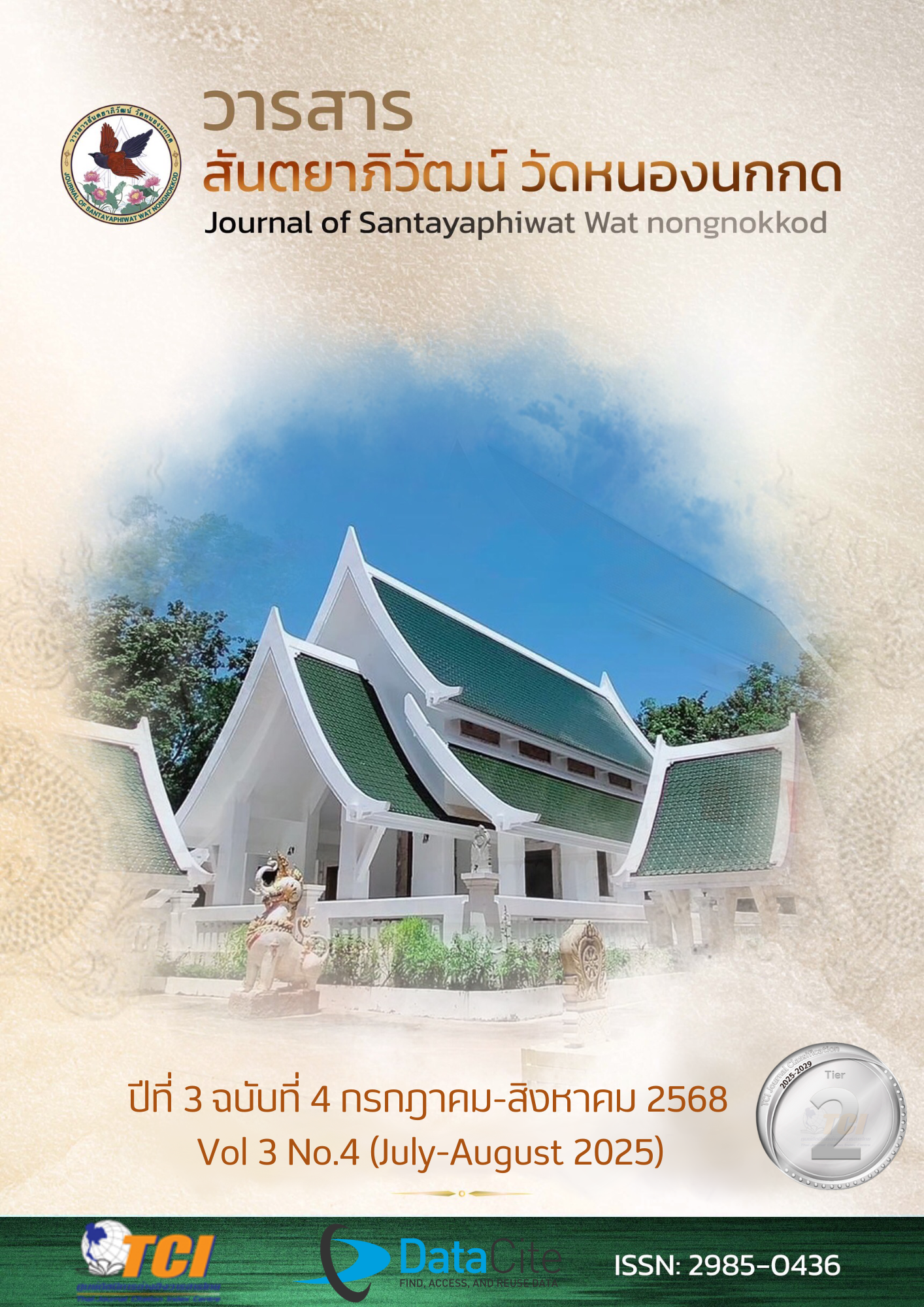THE DEVELOPMENT OF TEACHERS' LEARNING MANAGEMENT PROGRAM FOR STEM EDUCATION UNDER THE OFFICE OF MAHA SARAKHAM SECONDARY EDUCATION SERVICE AREA
Keywords:
Program Development, Learning Management, STEM EducationAbstract
This research aimed to: 1) examine the current conditions, desired conditions, and needs regarding STEM-based learning management among science and technology teachers under the Maha Sarakham Secondary Educational Service Area Office; and 2) develop a program to enhance STEM-based learning management for the same group of teachers. The study was conducted in two phases. Phase 1 involved surveying the current and desired conditions and the needs using questionnaires. The sample group consisted of 202 science and technology teachers selected through stratified random sampling, with the size of the educational institutions as the stratification unit. The data were analyzed using percentage, mean, and standard deviation. Phase 2 focused on program development based on data obtained from three STEM teachers recognized for best practices from three schools, and five experts purposively selected to assess the program’s appropriateness and feasibility. The research tools included structured interviews and evaluation forms for assessing program suitability and feasibility.
The findings revealed that the current condition of STEM-based learning management was at a high level, while the desired condition was at the highest level. The ranked order of priority needs was as follows: identifying problems, collecting data and related concepts, designing problem-solving methods, planning and implementing solutions, testing and evaluating results, improving outcomes, and presenting the results or products. The developed program comprised core principles, objectives, content, and activities organized into six modules. The development methods included self-directed learning, learning through hands-on practice, training sessions, and participation in seminars. The evaluation results showed that the program was rated as highly appropriate and highly feasible.
References
เชษฐา ค้าคล่อง. (2557). การพัฒนาโปรแกรมเสริมสร้างภาวะผู้นำแบบมุ่งบริการของผู้บริหารสถานศึกษาขั้นพื้นฐาน. ใน วิทยานิพนธ์ปริญญาการศึกษาดุษฎีบัณฑิต สาขาวิชาการบริหารและพัฒนาการศึกษา. คณะศึกษาศาสตร์ มหาวิทยาลัยมหาสารคาม.
ไท คำล้าน. (2551). การพัฒนาโปรแกรมฝึกอบรมเพื่อเสริมสร้างภาวะผู้นำทางสิ่งแวดล้อมศึกษาสำหรับผู้บริหารสถานศึกษา. ใน วิทยานิพนธ์ปริญญาการศึกษาดุษฎีบัณฑิต สาขาวิชาการบริหารและพัฒนาการศึกษา. คณะศึกษาศาสตร์ มหาวิทยาลัยมหาสารคาม.
นิภาภรณ์ ซ้ายโพธิ์กลาง. (2561). การพัฒนาโปรแกรมเสริมสร้างสมรรถนะครูด้านการบริหารจัดการชั้นเรียนในสถานศึกษาสังกัดสำนักงานเขตพื้นที่การศึกษาประถมศึกษานครราชสีมา เขต 7. ใน วิทยานิพนธ์ กศ.ม. การบริหารและพัฒนาการศึกษา. มหาวิทยาลัยมหาสารคาม.
พรรณวิไล ชมชิด. (2557). พฤติกรรมการสอนวิทยาศาสตร์. มหาสารคาม: ตักสิลาการพิมพ์.
ไมตรีแพน ลัลน์พัฒน์. (2564). ไมตรีแพน ลัลน์พัฒน์; ธรรมทัศนานนท์ สุธรรม. โปรแกรมเสริมสร้างสมรรถนะครูด้านการจัดการเรียนรู้ตามแนวทางสะเต็มศึกษา สังกัดสำนักงานเขตพื้นที่การศึกษาประถมศึกษามหาสารคาม เขต 1. วารสารพุทธปรัชญาวิวัฒน์, 5(2), 35-47.
สถาบันส่งเสริมการสอนวิทยาศาสตร์และเทคโนโลยี. (2558). สะเต็มศึกษา (STEM Education). กรุงเทพฯ: กระทรวงศึกษาธิการ.
สิรินภา กิจเกื้อกูล. (2558). สะเต็มศึกษา (STEM EDUCATION). วารสารศึกษาศาสตร์มหาวิทยาลัยนเรศวร, 16(2), 165-173.
สุวัฒน์ จุลสุวรรณ์. (2554). การพัฒนาภาวะผู้นำการเปลี่ยนแปลงผู้บริหารสายสนับสนุนสถาบันอุดมศึกษาของรัฐ. ใน วิทยานิพนธ์ปริญญาการศึกษาดุษฎีบัณฑิต สาขาวิชาการบริหารและพัฒนาการศึกษา. คณะศึกษาศาสตร์ มหาวิทยาลัยมหาสารคาม.
อาภรณ์ ภู่วิทยพันธ์. (2559). การพัฒนาขีดความสามารถของบุคลากรบนพื้นฐาน 70:20:10 Learning Model. กรุงเทพฯ: เอช อาร์เซ็นเตอร์.
Funnell, S. C., & Rogers, P. J. (2011). Purposeful program theory: Effective use of theories of change and logic models. John Wiley & Sons.
McCall, M., Lombardo, M. M., & Eichinger, R. A. (1996). The Career Architect Development Planner. Boston: Harvard Business School Press.









